Israeli writers were split by the Six-Day War. On one side was the poet Natan Alterman, whose Movement for the Complete Land of Israel tried to rally those artists who believed that Israel’s survival and the continued flourishing of the Jewish people depended on retaining the whole of the land. Opposed to them was what would become the peace camp, with novelist Amos Oz prominent in its ranks, warning that even a just occupation was an occupation nonetheless and advocating relinquishing part of the Land of Israel in order to save the Zionist project, which after all was about the liberation of a people, not a land. The argument between the poet and the novelist, notes Liam Hoare, is unresolved.
Dreams, such terrible dreams
In the immediate aftermath of the Six-Day War, poetry and song captured the moment in Israeli history when the people, as Natan Alterman, said were ‘drunk with joy’. Naomi Shemer’s addendum to ‘Jerusalem of Gold,’ a song penned, as the legend has it, while Israeli troops celebrated at the Western Wall, groans with the sound of ram’s horns echoing round the Old City. ‘We have returned to the water cisterns, to the market and to the square,’ Shemer sang. ‘We shall return and go down to the Dead Sea by the Jericho Road.’
The enduring popularity of ‘Jerusalem of Gold’ has done much to shape our understanding of the Six-Day War as a moment of jubilation and transformation for Israelis — which, indeed, for many it was. But Yehuda Amichai’s ‘Jerusalem 1967’ conveys, by contrast, a sense of foreboding. ‘Now that I’ve come back, I’m screaming /… and every morning I scream the scream of a new born baby / at the tumult of the houses and at all this huge light.’ That light, Amichai wrote, was ‘like the movement of a light veil: warning’:
Illuminated is the terrible, true X-ray writing
In letters of bones, in white and lightning: MENE
MENE TEKEL UPHARSIN
By the time Israeli novelists had assimilated the Six-Day War, its fruits – the uncertainties and insecurities Amichai felt early on – were flourishing. After June 1967, Israel quickly became bogged down in a War of Attrition in the Sinai. The Arab League adopted a belligerent position of no peace, no recognition, and no negotiations with Israel. The Palestine Liberation Organisation (PLO) recommitted itself to armed struggle as ‘the only way to liberate Palestine’. And, Israel began to construct security settlements in the Jordan Valley and repopulate Gush Etzion while presiding over an indefinite military occupation in the West Bank and Gaza Strip.
In the late 1960s and early 1970s, what one can detect most of all, so the professor and translator of Hebrew literature Robert Alter believed at the time, was ‘a high-pitched vibration of nervousness about the national setting’. Some authors dealt with this anxiety essentially by retreating from it. There was a discernable trend of Israeli novelists either breaking out of the contemporary Israeli setting, moving the action elsewhere, or going back to their own childhoods, as in Haim Gouri’s The Crazy Book (1972) or Hanoch Bartov’s Whose Are You, Son? (1970).
Others, like Amalia Kahana-Carmon in And Moon in the Valley of Ayalon (1971) would narrate their stories over the time period of the Six-Day War while keeping it very much in the background, mentioning it only in passing — which, in itself, is something of a commentary on the distance between the individual and a major historical event. A.B. Yehoshua though, took on the war as a setting and context for his fiction, as in the extraordinary 1972 novella Early In The Summer of 1970.
An aged teacher of biblical studies is confronted with news that his son, only recently returned from the US (and thus with a less tangible sense of his own Israeli identity) has been killed in service in the Jordan Valley, leaving behind a wife and child. The narrative moves between and confuses fantasy and exhausting reality — reflections on his relationship with his son; thoughts about his life’s work at the school; faltering attempts to break the news to his grandchild and his son’s colleagues at the university — until he reaches the military’s mortuary, where he realises the whole affair has been a tragic case of mistaken identity:
Someone is already standing beside one of the screens, draws a curtain aside, turns the blanket back, and I still afar, swept by a dreadful curiosity, my breathing faint, fading, heart almost still, slip out of the hands holding me, glide softly, irresistibly over there, to look at the pale face of a dead young man, naked under the blanket, at thin lines of blood circling blank half-open eyes. I shrink back slightly, the skullcap slips off my head.
A deep hush. Everyone is watching me. The chaplain stands motionless, his hand in his waistcoat, any moment now he will come out with a ram’s horn, blow us a feeble blast.
‘It isn’t him…’ I whisper at least with infinite astonishment, with glowing despair, with the murmur of the water flowing in this damned room.
Warren Bargad has argued that Early In The Summer of 1970 represents a change in style for Yehoshua who, at the outset of his literary career, wrote mostly surrealistic allegories. ‘Although his stories of the mid-60’s became less symbolic and more psychologically and social oriented,’ Bargad observes, ‘Yehoshua did not confront immediate realities in his works until after the Six-Day War’. This continued with his first novel, The Lover, and short stories like Missile Base 612 about a lecturer, whose marriage was disintegrating, sent to a military installation in the desert to address troops stationed there:
Solitary — he has become a solitary of late, has fallen into the solitary’s ways. He has started going to the cinema alone, has been caught talking to himself at traffic lights, to the amusement of people in nearby cars. Slowly he climbs on under the clear star-flecked sky, stops from time to time to peer at the missile pits, inspect them; the staleness of it, the hollowness, the tedium, the imminent divorce, the lone, onanistic nights, the child being ground down between them.
A change in Amos Oz’s work is also detectable after the Six-Day War. His early stories — the collection Where The Jackals Howl and novel Elsewhere, Perhaps — both concerned the kibbutz as a kind of fortress, an institution under siege, surrounded by enemies, be it wild animals, Arab military forces, or visiting strangers who constitute a disruptive force in community life. Beginning with My Michael — published in 1968 but written before the war — individual psychology comes to the fore in the case of Hannah Gonen and her gradual mental deterioration and retreat to the realm of fantasy, set against her failing marriage and staid Jerusalem life.
With Unto Death, though, there is a noticeable evolution in Oz’s style and subject. The collection comprises two novellas linked by mood and theme: Crusade, the less successful of the two, a historical tale of self-destructive crusaders who, in turn, wreck death and havoc upon Jewish bodies and villages as they make their way towards the Holy Land; and the superb, haunting Late Love, a paranoid monologue centred about an extermination plot that has a tremendous immediacy about it. One of the story’s final passages — and some of Oz’s best writing — captures its spirit and essence:
Spare a thought for the flavour of the nights here in Tel Aviv… there is no other city in the whole world where so many people dream such terrible dreams every night… this whole Jewish city cries out in its sleep. It is the sound of nightmares, of horrors past and horrors yet to come, all compressed on these hot dry nights. We are granted no more than a brief breathing space. (…) The Jewish people are totally unable to withdraw from the game once and for all. Did we really hope to take refuge here and build a new land and pretend to be a Bulgaria or a New Zealand? (…) All the anger, all the misery, all the enthusiasm, all the hysteria, all the madness in the world, all the revolutions and ideologies and complexes and suffering and horror, everywhere, are all directed against us.
When I met Oz last year for an interview that appeared in The Forward, he told me that Crusade could not have been written without the Holocaust there in the background. ‘It’s a certain perspective of fanaticism, of anti-Semitism, of Jew-hating, of prejudice, which I wouldn’t have ever reached were it not for the Holocaust,’ Oz said. But both Crusade and Late Love are also clearly informed by the months and years leading up to the Six-Day War, a period of tension and existential angst when the notion that the Arab world was about to visit unto Israel a second Holocaust, that the very future of the State of Israel was at stake, gained common currency.
As seen through Israeli literature, then, the Six-Day War was not a triumph, a cause for celebration as the song ‘Jerusalem of Gold’ would have it. Nor was it a break that, with victory and territorial expansion, ushered away the terrible fears of the past. To read Late Love is to understand that those fears never receded. Rather, the Six-Day War was a bridge that Israel moved from one period of anxiety to another. On the other side was not peace but a new set of worries and uncertainties, problems and dilemmas, traumas and nightmares.
‘The Land of Israel’ or ‘Peace Now’?
The Six-Day War would not only change Israeli literature but those who wrote it. Not long after the fighting ceased, on a humid day at the café of the Writers’ House on Eliezer Kaplan Street in Tel Aviv, the premier Hebrew poet of his day, Natan Alterman, presided over a meeting of writers and intellectuals who, as Yossi Klein Halevi describes in Like Dreamers, had answered his call to action.
Alterman aligned himself with the likes of Nobel Prize-winning novelist Shai Agnon, poet Uri Zvi Greenberg, as well as Haim Gouri and Moshe Shamir who came out of the Labor movement, to become charter members of The Movement for the Complete Land of Israel. Their manifesto, launched in July 1967, argued in part that, ‘just as we are not permitted to relinquish the State of Israel, so we are commanded to maintain what we have received from its hands: the Land of Israel. We are hereby loyally committed to the wholeness of our land,’ they stated absolutely, ‘and no government in Israel is entitled to relinquish this wholeness’.
Around the same time, in the now-defunct Labor newspaper Davar, Amos Oz put forward a rather different view, one shared by a younger generation of writers including Yehoshua and Amichai. ‘I am a Zionist in all that concerns the redemption of the Jews, but not when it comes to the “redemption of the Holy Land,”’ Oz wrote. ‘The word “liberation” applies to people, not to dust and stone.’ Pushing back against messianic tendencies brought to the surface by the Six-Day War, Oz warned:
If from now on the current which has flowed within Zionism almost from the beginning, the current of nationalistic romanticism and mythological delusions of greatness and renewal — if that trend prevails among us, then the Middle East is fated to be the battleground of two people, both fighting a fundamentally just war, both fighting essentially for their life and liberty, and both fighting to the death.
Thus Israeli writers were split. On one side was The Movement for the Complete Land of Israel, and those who believed that Israel’s survival and the continued flourishing of the Jewish people depended on retaining the whole of the land. Opposed to them was what would become the peace camp, those who warned that even a just occupation was an occupation nonetheless and advocated relinquishing part of the Land of Israel in order to save the Zionist project, which after all was about the liberation of a people, not a land.
It was a political argument, of course, and an intra-Zionist one to boot. Israeli novelists and poets, Robert Alter once observed, ‘are notable for their unwillingness to drop out of, or rebel against, the troubled national enterprise’. But it was also, to a certain extent, a literary debate. At that initial gathering of The Movement for the Complete Land of Israel, Halevi writes that Alterman pounded the table when it was suggested that the group reach out to Oz, to broaden the movement of those committed to keeping the entirety of the land:
For Alterman, Oz’s offense was not only political but literary: he was part of a generational revolt against the writers of 1948, against the mythic Zionist themes of destruction and rebirth. Oz and his fellow young novelists wrote in a spare Hebrew about the Palestinian tragedy and the decline of kibbutz idealism. For Alterman it was no surprise that they opposed annexing Judea and Samaria: their Zionism, like their prose, was anaemic.
In fact, Oz grew up in a Revisionist Zionist milieu in Jerusalem. ‘I was very hawkish,’ Oz told me, as we talked about his childhood over coffee in his study. ‘I was very enthusiastic about the battlefield’ he added. The politics of his family, the Klausners, were that of Jabotinsky, ‘a unique combination of very emotional nationalism and very genuine liberalism and pluralism’. They were also ‘secular to the bone,’ unlike the head of the Revisionist movement in 1967, Menachem Begin, who fused Jabotinsky’s ideas ‘with certain East European Jewish religious sentiments’.
‘I might be one of the very few mice in history who fled into a sinking boat,’ Oz joked. In a conversation with Ari Shavit for his book My Promised Land, Oz explains how, counter to the spirit of post-war triumphalism present in June 1967 — and not unlike Amichai in Jerusalem 1967 — returning to the city of his childhood made him aware of the perilous position Israel now found itself in. ‘I understood that although Jerusalem is my city, it is a foreign city,’ he said. ‘I knew I should not rule over it, that Israel must not rule over it. Old Jerusalem is our past, but it is not our present, and it endangers our future.’
Alterman, by contrast, believed Jerusalem and the newly acquired territories were the Jewish people’s past, present, and future — theirs to keep on security grounds, as well as moral and historical grounds. As Tsur Ehrlich has observed, Alterman thought ‘the Jewish people was the only people to see the land of Israel as a distinct, and unique, geographic entity’. The whole Land had a ‘spiritual and practical importance to the people’ and to cede part of it would be to break the link between the Jewish people and the Land of Israel. Alterman had above all, Ehrlich writes, a deep belief in ‘the exalted destiny of the Jewish people and in the mission of the Zionist enterprise’.
This schism between Oz and Alterman would, in time, divide and define Israeli politics and society, yet the path advocated by neither writer was taken in the end. Alterman died in 1970, his dream of mass aliya unrealised. The Movement for the Complete Land of Israel failed as an independent parliamentary movement and was eaten up by the Likud. Israel never did annex the West Bank and the idea of liberating the entire land withered and gave way to perpetual occupation.
Of course, Oz’s vision of political separation wasn’t realised, either. In the 1980s and early 1990s, the peace camp was a mass movement, though as its ideas were sublimated into the mainstream and the Israeli polity inched rightward, it withered away. ‘The Israeli in the street is more hawkish than he or she used to be then or twenty years ago,’ Oz conceded to me, and yet ‘the vast majority of the Israeli people would unhappily support a two-state solution’. Thus ‘there are more superficial movements towards a hawkish right-wing edge, and the same time some subterranean movement towards a more pragmatic, more compromising attitude’.
The argument began at the Writers’ House in Tel Aviv and the pages of Davar some 50 years ago thus remains unresolved.

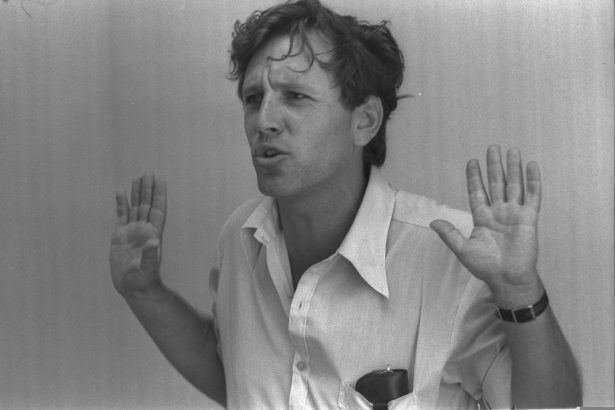

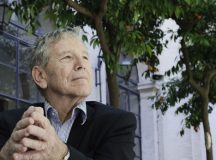
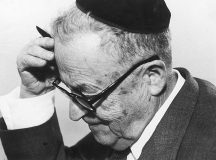
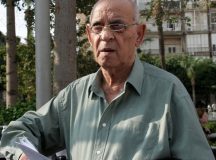
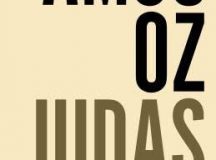































A very interesting article, for which much thanks.
Unfortunately, however, the concluding paragraph is ahistorical to the point of being bizarre.
You write:
“In the 1980s and early 1990s, the peace camp was a mass movement, though as its ideas were sublimated into the mainstream and the Israeli polity inched rightward, it withered away.”
“Inched rightward”. “Withered away”.
Well, OK, but why did this happen? What was the cause? Why did the “Israeli polity [inch] rightward”?
Of this there is no mention. (Though one might claim that this was not the purpose of the article/interview)
And the resulting disinformation is profound.
True, Netanyahu was elected in 1996 (helped in large part by Hamas’s terror campaign); but three years later, Ehud Barak beat Netanyahu by a landslide. Alas, two years after that, Barak, disgraced, was beaten by Sharon.
So what happened to make the Israeli polity inch rightward? To make the peace camp wither away?
Might it have something to do with Barak’s offer to Arafat in 2000 (rejected); and Barak’s offer to Arafat in 2001 (also rejected); and the second Intifada with huge Israeli civilian casualties; and Sharon’s decision to leave Gaza in 2005 (resulting in a Hamas takeover and three wars, with more on the way); and Olmert’s offer to Abbas in 2008 (also rejected)—and all the delegitimization of Israel, the stabbing Intifada, the rejections of Netanyahu’s efforts and everything since…. (nor should one forget the War with Hezbullah in 2006)?
But there is no mention of any of this.
Such that, “…though as its ideas were sublimated into the mainstream and the Israeli polity inched rightward…” while an accurate description of what essentially happened, is also, because it provides absolutely no historical context, gross disinformation.
And yet, and yet, Oz says: “‘the vast majority of the Israeli people would unhappily support a two-state solution’”.
Which, yes, does still seem to be the case—at least in theory (because one who makes, and believes, such a statement indicates that one, alas, hasn’t a clue about what the I-P conflict is about).
But assuming that it is I who doesn’t have a clue, then, if Oz’s quote is true, what does this really say about Israelis (and why “unhappily”)?
Does it mean that, in spite of everything—of everything!!—Israelis are still prepared to compromise for peace (at least, “peace” as defined by those Israelis)?
And if this is what it does indeed mean, then what does it mean about Israel and the quest for peace?